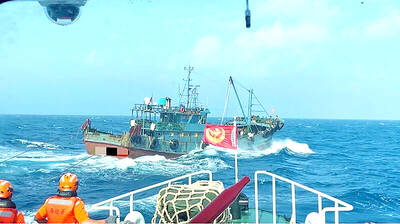Nintendo Co became the first of the world's biggest computer and electronics manufacturers to score zero points in a report by Greenpeace International measuring company policies on use of toxic chemicals and recycling.
The Kyoto-based maker of Wii game consoles was criticized for lacking policies on eliminating the use of vinyl plastics and brominated flame retardants and its limited recycling of used consoles and products. The company, included in the report for the first time, scored zero points in a total of nine categories, Greenpeace said.
"We observe regulations in the countries where we're operating," Nintendo spokesman Yasuhiro Minagawa said.
He could not confirm whether Greenpeace previously contacted the company to obtain data.
The Greenpeace Guide to Greener Electronics, published for the sixth time on Monday, ranks the world's 18 biggest electronics makers according to information published on the companies' Web sites. The survey is aimed at pressuring companies to take responsibility for their products' entire life-cycle, the report said.
Microsoft Corp, maker of the Xbox 360 game console, ranks 16 among the 18 companies surveyed because it does not plan to eliminate toxic chemicals from products until 2011. The Redmond, Washington-based company was ranked "bad" or "partially bad" in all four recycling categories.
"Microsoft is committed to environmental sustainability and has many programs and policies in place to lessen our footprint," said Charlene Chian, a Singapore-based spokeswoman for Microsoft, in an e-mail. "In our consumer electronics business, we comply with and exceed all environmental guidelines and regulations."
Sony Ericsson Mobile Communications Ltd, the world's fourth-largest maker of mobile phones, topped the rankings for its January deadline for eliminating brominated flame retardants and recycling of older mobile phones. The company's handsets have been free from vinyl plastics since last year, Greenpeace said.
Espoo, Finland-based Nokia Oyj fell to ninth in the latest survey from first because of deficiencies in its policies for taking back older products in Thailand, Russia and Argentina during the survey period, the environmental group said.

MILITARY BOOST: The procurement was planned after Washington recommended that Taiwan increase its stock of air defense missiles, a defense official said yesterday Taiwan is planning to order an additional four PAC-3 MSE systems and up to 500 missiles in response to an increasing number of missile sites on China’s east coast, a defense official said yesterday. The official, who spoke on condition of anonymity, said that the proposed order would be placed using the defense procurement special budget, adding that about NT$1 trillion (US$32,88 billion) has been allocated for the budget. The proposed acquisition would include launchers, missiles, and a lower tier air and missile defense radar system, they said The procurement was planned after the US military recommended that Taiwan increase

POLITICAL AGENDA: Beijing’s cross-strait Mid-Autumn Festival events are part of a ‘cultural united front’ aimed at promoting unification with Taiwan, academics said Local authorities in China have been inviting Taiwanese to participate in cross-strait Mid-Autumn Festival celebrations centered around ideals of “family and nation,” a move Taiwanese academics said politicizes the holiday to promote the idea of “one family” across the Taiwan Strait. Sources said that China’s Fujian Provincial Government is organizing about 20 cross-strait-themed events in cities including Quanzhou, Nanping, Sanming and Zhangzhou. In Zhangzhou, a festival scheduled for Wednesday is to showcase Minnan-language songs and budaixi (布袋戲) glove puppetry to highlight cultural similarities between Taiwan and the region. Elsewhere, Jiangsu Province is hosting more than 10 similar celebrations in Taizhou, Changzhou, Suzhou,

COGNITIVE WARFARE: Chinese fishing boats transmitting fake identification signals are meant to test Taiwan’s responses to different kinds of perceived incursions, a report said Chinese vessels are transmitting fake signals in Taiwan’s waters as a form of cognitive warfare, testing Taipei’s responses to various types of incursions, a report by the Institute for the Study of War said on Friday. Several Chinese fishing vessels transmitted fake automatic identification system (AIS) signals in Taiwan’s waters last month, with one mimicking a Russian warship and another impersonating a Chinese law enforcement vessel, the report said. Citing data from Starboard Maritime Intelligence, the report said that throughout August and last month, the Chinese fishing boat Minshiyu 06718 (閩獅漁06718) sailed through the Taiwan Strait while intermittently transmitting its own AIS

CHINESE INFILTRATION: Medical logistics is a lifeline during wartime and the reported CCP links of a major logistics company present a national security threat, an expert said The government would bolster its security check system to prevent China from infiltrating the nation’s medical cold chain, a national security official said yesterday. The official, who wished to stay anonymous, made the remarks after the Chinese-language magazine Mirror Media (鏡周刊) reported that Pharma Logistics (嘉里醫藥物流) is in charge of the medical logistics of about half of the nation’s major hospitals, including National Taiwan University Hospital and Taipei Veterans General Hospital. The company’s parent, Kerry TJ Logistics Co (嘉里大榮物流), is associated with the National Committee of the Chinese People’s Political Consultative Conference (CPPCC) and the Chinese People’s Liberation Army (PLA), the